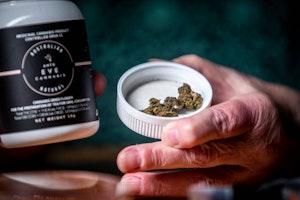
Linalool: The Powerful Terpene That Can Help Opioid Addiction
Linalool’s value is of special note during a modern epidemic of opioid use and addiction to pharmaceutical drugs like Percocet, Vicodin, and Oxycontin.
Terpenes are the delicate molecules in cannabis that are responsible for its aroma. But those who believe the role of terpenes is only to stimulate one’s olfactory senses are sadly mistaken. Research studies have proven the medical efficacy of a wide variety of terpenes, including their ability to kill cancer, relieve depression, and reduce inflammation.
Understanding linalool

An individual strain of cannabis can contain a mix of more than 200 terpenes. One of these terpenes, linalool, has been shown to offer a wide variety of medical benefits.
Terpenes like linalool, which are available in a variety of aromatic herbs (not only cannabis), have been used for millennia to treat a wide array of medical conditions. Modern research has confirmed the practices of ancient civilizations, revealing strong medical efficacy for many severe conditions.
Modern research has confirmed the practices of ancient civilizations, revealing strong medical efficacy for many severe conditions.
Linalool has been shown to be a major anti-inflammatory, meaning it helps those with cancer and arthritis. Research has also proven the value of this terpene for treating anxiety and insomnia due to its sedative properties.
Linalool medical efficacy

Linalool is actually one of the minor terpenes available in certain strains of cannabis. It is found in smaller quantities than major terpenes like myrcene (the most common), pinene, and limonene. It emits a floral, sometimes spicy aroma. Hundreds of species of plants produce linalool, including a variety of mints and herbs.
Linalool relieves a number of symptoms, including pain, depression, seizures, and inflammation. Because it acts as a sedative, it is helpful for treating insomnia – its tranquilizing effects can help many who suffer from a variety of types of psychosis.
Analgesic properties

Because of its analgesic, or pain-killing, properties, linalool is a powerful treatment for several diseases, including multiple dystonia, chronic pain, and arthritis.
When used in combination with major terpenes and cannabinoids (like THC, CBD, CBN, and CBC), this powerful terpene is serious medicine in a patient’s pain management arsenal.
Linalool’s value is of special note during a modern epidemic of opioid use and addiction to pharmaceutical drugs like Percocet, Vicodin, and Oxycontin.
Research studies

A study published in the Journal of Phytomedicine in 2002 showed that linalool is a major anti-inflammatory agent, potentially helping with ailments such as cancer and arthritis. The same research team, in a follow-on study in 2003, discovered that linalool is also a pain killer.
These researchers again, in 2006, conducted another linalool study that further examined data from animal models. This study reinforced the fact that linalool is a powerful anti-inflammatory.
The sedative qualities of linalool were proven in a 2008 study published in the American Association of Nurse Anesthetists Journal. The research estimated that 19 million Americans suffer from anxiety-related ailments and revealed linalool to be a sedative capable of providing real efficacy to them.
Better than opioids

In a world crippled by addictions to opioids and other pharmaceutical therapies, the value of natural terpenes in the treatment of serious disease if of special merit.
Patients can often – through the consumption of herbs that contain terpenes like linalool, including cannabis – reduce or avoid the negative side effects of synthetic drugs.
Herb Recommended Products:
READ MORE










